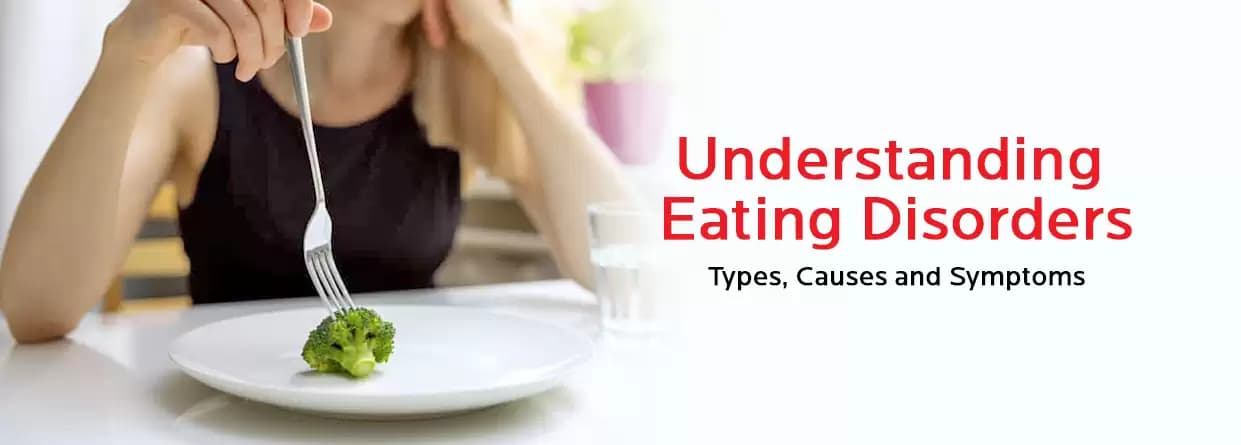
Eating disorders are one of the grave, intricate, and mental health problems affecting the emotional well-being and physical health of a person. People who have this disorder develop an unhealthy association with food, weight, and the way they look.
Did you know that eating disorders are affecting millions of people, capping age, gender, and cultural confines? Well, yes, that’s true. We live in a world captivated by societal beauty standards and appearances, that no one pays attention to this soundless pandemic looming in the shadows. This topic really requires consideration, understanding, and most importantly, empathy.
Eating disorders are not simply about food, it is a contemplation of deep psychological battle, emotional upheaval, and societal pressures. In this blog, we will provide a deep understanding of these disorders, and help you understand the signs, causes, and treatment options. If you suspect that you might be suffering from eating disorders, make sure to book your appointment with one of the renowned healthcare services, The Calcutta Medical Research Institute in Kolkata. You will find the most professional and experienced healthcare experts who will ensure proper diagnosis and treatment that’s suitable for you.
Please note that the information given in this blog is entirely research-based and we do not encourage neglecting consultation with a healthcare professional in any way.
Eating disorders are one of the grave, intricate, and mental health problems affecting the emotional well-being and physical health of a person. People who have this disorder develop an unhealthy association with food, weight, and the way they look. If this disorder is not treated on time, it leads to developing life-threatening issues. Eating disorders can impair several organs of the body such as bones, teeth, mouth, heart, and digestive system. They are also linked to other diseases and mental health issues like anxiety, self-harm, depression, etc. With the right treatment, one can go back to their regular eating habits and discover ways to healthier life. Treatment on time can help in reducing or reversing severe issues caused by this condition.
Eating disorders are divided into three types. Some people might suffer from one type, while some may have only one type of eating disorder. Here are the types:
Eating disorder symptoms might vary depending on its type. It is complex to find an eating disorder as usually it is misunderstood as dieting. People battling with eating disorders restrict themselves from sharing their eating habits or problems. Here are common symptoms of eating disorders that should not be overlooked:
Here are other unusual symptoms that reflect an eating disorder:
Eating disorders are related to intricate mental health conditions having several causes. They are often an outcome of different factors such as environmental, biological, and psychological. Eating disorder causes might depend from person to person, however, here are some of the common factors that are linked with this condition:
Healthcare professionals initiate eating disorders diagnosed depending on their symptoms and review eating patterns including behaviors. It is recommended to consult a general physician and mental health expert to confirm the diagnosis. Here is how eating disorders are diagnosed:
Eating disorders treatment depends on the type and particular needs of the patient. Even, when a person is not diagnosed with this condition, healthcare professionals can help in addressing and managing food-related problems. Here are some of the options usually involved in treating eating disorders:
Eating disorders are the reflection of mental health conditions affecting people of all age groups and genders. It is important to comprehend and address the problem with kindness, understanding, and helpful treatment. One must know that this condition is merely not about weight and food, but a way to deal with issues like psychological, emotional, and environmental. So, prompt medical attention is required to treat the problem. Education and raising awareness play an important role as we can help people battling eating disorders and give them the support they need. All we need to know is recovery is possible with proper guidance and treatment options.
It is important to look for signs like mood swings, habits of hiding food, not eating with our friends and family, solo dining, food fixations, etc. If you notice any of these, it means you have an eating disorder. However, without proper diagnosis it is hard to tell, so make sure to get in touch with a doctor.
Getting in touch with a healthcare professional is always the best idea to cure eating disorders. They might recommend options like psychotherapy, medications, nutrition counseling, etc.
Eating disorders are not a disability but a behavioral condition determined by different eating patterns.
Written and Verified by:

Aparna Ladha Somani has joined The Calcutta Medical Research Institute as a consultant Clinical Psychologist in the department of Psychiatry.
© 2024 CMRI Kolkata. All Rights Reserved.